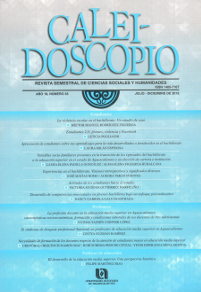Socio-family variables in the transition from high school graduates to higher education in the state of Aguascalientes and their career and institution choice
DOI:
https://doi.org/10.33064/33crscsh560Keywords:
high school students, educational aspirations, expectations for attending collegeAbstract
This paper focuses on the study of high school senior students’ educational expectations, and the role of variables related to socio-economic status and family characteristics in the state of Aguascalientes. In addition, these expectations are examined to identify the type of transition that these students made into higher education regarding the institution as well as the major they were expecting to get in. The theoretical framework relies on key concepts related to educational expectations for attending college. A survey was administered to a statewide stratified random sample made of 2,113 high school senior students; once they graduated and based on the survey findings, a sub-sample made of 35% of the surveyed students was briefly interviewed in order to identify the extent to which they accomplished or failed their educational expectations. The results show that most students are expecting to attend college (87.5%), albeit 61.1% would combine work and study. Students’ educational expectations were significantly associated with their academic achievement, age, socio-economic status, their perception of the family support, as well as the type of high school they were enrolled at. In addition, educational expectations were also related to the primary type of college and major they expected to be admitted in. Considering the follow-up sub-sample, it was observed that half the students made a successful transition into college; these successful students were mostly men, students with a high academic achievement, and students from a high socio-economic status.
Downloads
Downloads
Published
How to Cite
Issue
Section
License
Licencia Creative Commons Atribución-NoComercial-CompartirIgual 4.0 Internacional
El lector es libre de compartir o adaptar el material en cualquier medio o formato bajo las condiciones siguientes: (a) debe reconocer adecuadamente la autoría, proporcionar un enlace a la licencia e indicar si se han realizado cambios; (b) no puede utilizar el material para una finalidad comercial y (c) si remezcla, transforma o crea a partir del material, deberá difundir sus contribuciones bajo la misma licencia que el original.
Resumen de la licencia
https://creativecommons.org/licenses/by-nc-sa/4.0/deed.es_ES
Texto completo de la licencia
https://creativecommons.org/licenses/by-nc-sa/4.0/legalcode
Cada autor es responsable del contenido de su artículo. En el caso de un texto colectivo, el primer autor asume la responsabilidad intelectual de los resultados del proceso editorial; los autores son responsables de obtener la licencia de autor para reproducir materiales gráficos o fotográficos que pertenecen a terceros.
Los autores asumen plena responsabilidad en el caso de falsificación de datos o falta de autenticidad en la investigación. Se comprometen, también, a no reutilizar trabajos ya publicados, total o parcialmente, para presentarlos en otra publicación.
Estas condiciones aplican tanto a la versión impresa como a la versión electrónica de la revista.


















